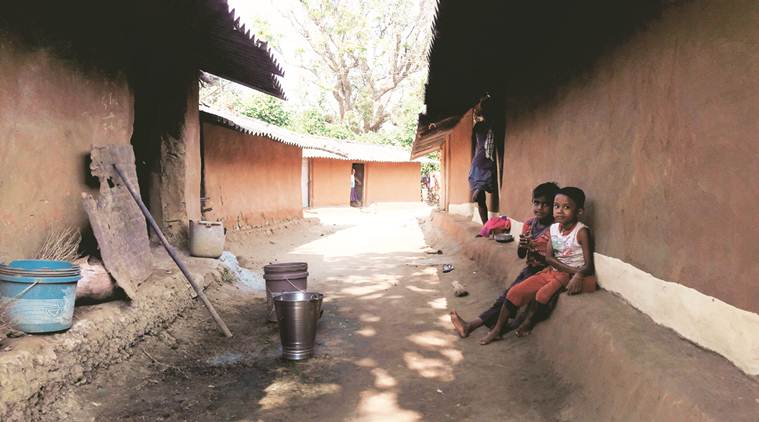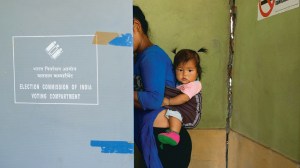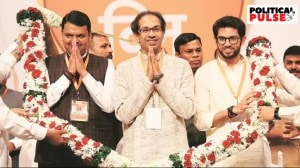- India
- International
Chhattisgarh: At Salwa Judum camp, families forgotten for 13 years, untouched by poll campaign
Gopal Ramteke struggles to find a word that describes who they are, then finally says it aloud. “Sharanarthi”. Refugee. He and 1,700 other families who remain at a Salwa Judum camp in Cherpal are refugees of a war between the state and Maoists.
 Their living quarters: mud huts, parts of which collapse when it rains. (Express photo by Dipankar Ghose)
Their living quarters: mud huts, parts of which collapse when it rains. (Express photo by Dipankar Ghose)
IT HAS been thirteen years, but the memory of 2005 still evokes a choked silence. They look down at the ground, and speak in hushed tones. As their villages were ransacked and violence broke out all around them, they left their homes, which their families had lived in for generations, with only the clothes on their back and their children in their arms.
Gopal Ramteke struggles to find a word that describes who they are, then finally says it aloud. “Sharanarthi”. Refugee. He and 1,700 other families who remain at a Salwa Judum camp in Cherpal are refugees of a war between the state and Maoists. Landless, with no source of income or employment, and the constant fear of death. And a politics, that even in election season, completely passes them by.
“In our village of Paddeda, the violence was just growing. Salwa Judum was at its peak, and there were days when we would find bodies in the fields. We didn’t know if the dadalog had killed people, or the police, but the violence just grew. One day, we heard sounds of firing, and by then the fear was deep. There were only two options. Go to the dadalog, or come to these ‘rahat shivirs’. Paddeda is only 3 km from Cherpal, but we ran all the way. Since then we have been here, and have been forgotten,” he said.
Over a three-month period in 2005, as violence broke out during the Salwa Judum and thousands were displaced across the state, three thousand families made the same choice as Ramteke and arrived in Cherpal. Of these, 1,700 are now left, while the rest have moved to places like Bijapur, the district headquarters, 20 kms away. Their living quarters are the same as they were back then. Ramshackle mud huts, stacked against each other, parts of which collapse in the rain. There is no drainage system, and as the water enters their homes when it rains, many take refuge in the primary school nearby.
“Just two months ago, part of a roof fell on a woman who was cooking in her home, and broke her leg. In 13 years, all that the government has given us is an asbestos sheet for a roof, and then two months ago, electricity. We have spent years petitioning the government and politicians to help us, but nobody does,” said Govind Pagdikar, who also escaped from Paddeda in 2005.

For over a decade, their primary demand has been allotment of the land they now live on, or a small patta of land elsewhere. Ramteke owned and farmed on five acres of land, Pagdikar owned 20 acres, Laccham Majjhi from Padnur village owned 15 acres, and Padam Lakkhui from Palnar owned 12 acres of land. But they can never return home.
“The land there is still in our names, but we can never go back to the villages. Once you have lived in the shivirs, the Maoists think you are with the government. They will kill us if we go back. So, we now live on this government land which is not our own. We had everything, the conflict took it all away. The least the government can do is help us,” said Majhhi.
Pagdikar said he grew paddy, millets and barbatti on his 20 acres of land in Paddeda. But he is now landless, and does odd jobs through the week, or works on fields owned by others, to scrape together about Rs 1,800-2000 every month. “Our children go to school, and we need money for them. If a small patta of land is given, maybe we can grow something for our families. If that’s not possible, can they not at least give us pucca houses, so that we don’t have to live with the additional fear of death? Every day, when we go out, we look left and right to see if it is safe. We need a patta, a makaan, and a little zameen to begin rebuilding our lives,” he said.
Since fleeing their villages, at least four elections, both for the assembly and Lok Sabha, have taken place. Each time, they say, nobody visits their homes. “Road pe halla karke challe jaate hai. Kabhi aate nahi. (They shout outside on the road. They never come). Once, in 2005, Chief Minister Raman Singh came for some government programme and made promises of a home and land. This was just after we had arrived.
But since then, nobody has come. Forget the elections, a couple of years after we came here, police picked up and killed two people from Cherpal and said they were Maoists. We protested, but even then nobody came,” said Pagdikar.
Over the years, all the families have registered as voters in Cherpal, and go out to vote on polling day. Villagers admit that over time, they have largely voted for the sitting MLA, Forest Minister Mahesh Gagda, in the hope that the government would do something.
This time though, there is not so much a shift against the BJP, but a conviction that they will only vote for a leader who comes and listens, even in the last two days before polling. “Our votes are not certain this time. We will vote for the person who we think will help us and raise our issue,” said Ramteke.
Apr 19: Latest News
- 01
- 02
- 03
- 04
- 05






































